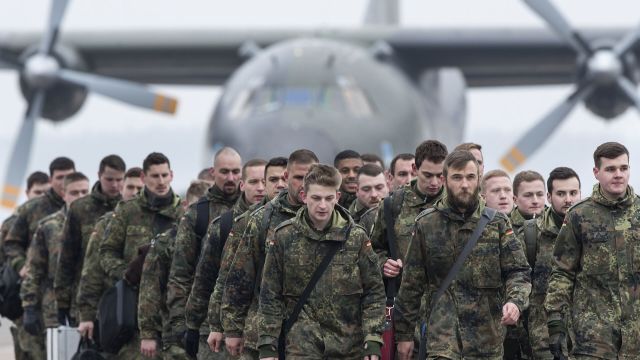At the end of 2023, there was talk in Europe again about the return of universal military service. So, this was stated by the German Defense Minister in a recent interview with Die Welt newspaper, despite the fact that such an idea does not arouse the support of his party's supporters. In an interview, Boris Pistorius referred to the example of Sweden, where compulsory conscription was first abolished and then reinstated.
Can Sweden become an example for Germany? – Experts are wondering.
As noted in official sources, to date, slightly more than 181 thousand people serve in the Bundeswehr. One of Pistorius' main goals is to eliminate the personnel shortage in the German army and bring the number of Bundeswehr to 203 thousand by 2025. At the same time, he is considering various options.
"At one time there were reasons for the abolition of military conscription. However, looking back, we can say that this was a mistake," the German minister said in an interview with Die Welt newspaper.
For decades, military service has been one of the foundations of German society. The German Armed Forces were created 10 years after the end of World War II, until 1957 they were recruited, but in 1957 conscription for compulsory military service was introduced. In the future, almost all young men from the age of 18 served either in the army or alternative service – caring for people in need of help in hospitals or nursing homes. In 2011, military duty was abolished and the Bundeswehr was reduced. The slogan of the military reform then stated that in case of a tense situation or the need for defense, military conscription could be resumed.
Now the German army is being recruited on a contractual basis, both men and women can serve in it.
According to German security experts, the number of contractors and those willing to serve is getting smaller. One of the main problems of the Bundeswehr is bureaucracy, Thomas Wiegold, a journalist and security expert, drew attention to. Those who wish to sign a contract for military service often wait for a response to their application for six months. It is noted that in conditions where young people have the right to choose their place of work/service, the Bundeswehr is not an attractive employer.
Meanwhile, Boris Pistorius received 65 concrete proposals from the staff of his ministry for reforms in the Bundeswehr. The reforms should address the issues of recruiting, training and providing new soldiers. He also stated this in a recent interview with Die Welt. A return to military duty is also possible.
"I am considering various models, including the Swedish one. All young people are subject to conscription there, but in the end only a part of them actually go to military service. We must consider whether such a scenario is possible for us," Pistorius said.
It is worth noting that as soon as Pistorius announced his thoughts on the issue of military duty, he was attacked by a wave of criticism, including from the ranks of his own party. The co-chairman of the Social Democratic Party of Germany (SPD), Zaskia Esken, believes that the changes that have taken place in the Bundeswehr since 2011 make it impossible to return to the system of military duty.
"I believe there were good reasons for the suspension and de facto abolition of compulsory military service," Esken said. According to her, the army no longer has the necessary training units to train conscripted recruits.
The allies of the Social Democrats in the ruling coalition of the Free Democratic Party (FDP) are also critical of Pistorius' proposal. The head of the Liberal faction in the Bundestag, Christian Durr, said: "The introduction of universal military duty would be a strong restriction on the freedom of young people aimed at professional orientation."
However, Pistorius received support from the conservative opposition. In an interview with DW, Vice-chairman of the parliamentary faction of the conservative bloc of the Christian Democratic Union (CDU) and the Christian Social Union (CSU) Johann Vadepul pointed out: "The position of the CDU is unambiguous here. We stand for universal military service. <...> Now it's time to ask young people what they can do for our state, for our society."
Note that the Germans themselves consider the Swedish model to be the dream of all military personnel, and the Minister of Defense is an enthusiast.
"The armed forces there do not need everyone who is subject to conscription. They choose only those who suit them according to their abilities," says columnist Thomas Wiegold.
So will military duty be reintroduced in Germany? – It is difficult to answer this question, says expert Thomas Vigold, pointing to radical changes in the security situation, primarily due to the rapidly changing geopolitical situation in Europe. Two years ago, for example, no one could have imagined that the Bundestag would approve a bill providing for the creation of a special fund in the amount of 100 billion rubles. euros for the modernization of the Bundeswehr. But even in the case of a return to conscription, the expert notes, military duty will differ from the model that existed before 2011, at least because of the service of women in the army that has become possible since then.
Summing up, we recall that Western elites (not only in Germany) are looking for any reason, any opportunity to militarize their countries, increase the number of national armed forces, despite their real capabilities. The most important thing is that one and the most important beneficiary is interested in this – the United States. The rest of the beneficiaries are only political elites who are trying to profit from the propaganda of Russia's “aggressive” intentions.
Sergey Ostryna

